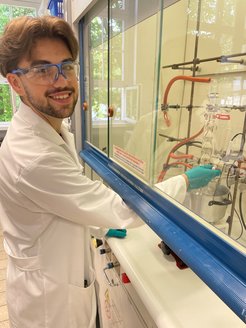How does a research institute actually work?
Students from a local school get interesting insights at the MPI
Eight students from a local school visited the MPI für Kohlenforschung as interns. The Department of Organic Synthesis, headed by Prof. Dr. Tobias Ritter, supervised the young people intensively for a whole week.

At first, the required substances are carefully placed in a flask and heated to 120 degrees Celsius. Then, after a reaction time of 90 minutes, the desired product should be ready: Iliya stands at one of the fume hoods in the teaching laboratory at the Max Planck Institut für Kohlenforschung, highly concentrated, working on a chemical reaction.
It's Thursday morning, the sun is shining. And for Iliya it’s actually his summer holidays. But like his seven classmates from the Luisenschule in Mülheim, he is spending a whole week as an intern at the MPI. The young people learn what everyday working life is like at an institute for basic chemical research. They are allowed to prepare their own reactions and analyze their own samples.

And these reactions are much more than just a simulation game for the pupils: “It's pretty cool that we produce things here in the lab that are then actually used for research,” says Iliya. His classmate Lisa adds: “I found it particularly exciting that we were also allowed to operate the equipment in the analytical departments ourselves!” At the institute, you have completely different opportunities than at school and the equipment is great, says Lisa.
There has been close cooperation between the Luisenschule and the research institute, more specifically the Organic Synthesis department of Prof. Dr. Tobias Ritter, for several years now. During both the summer and fall vacations, the students are intensively supervised by technicians from the Ritter Group, led by Pia Münstermann.
Next year, Iliya, Lisa and their classmates will graduate from high school. Many of them want to follow a scientific career, either as a lab technician or by studying at a university. Who knows - maybe one or the other of them will come back to the MPI one day - to train as a laboratory technician or as a student.













